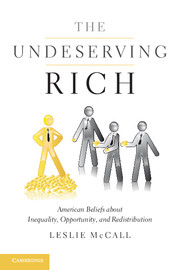Book contents
- Frontmatter
- Contents
- Tables and Figures
- Preface and Acknowledgments
- Introduction: Thinking about Income Inequality
- 1 Beyond the Opposition between Opportunity and Inequality
- 2 The Emergence of a New Social Issue
- 3 American Beliefs about Income Inequality
- 4 Why Do Americans Care about Income Inequality?
- 5 Americans' Social Policy Preferences in the Era of Rising Inequality
- Conclusion: A New Era of Beliefs about Inequality
- Notes
- References
- Index
4 - Why Do Americans Care about Income Inequality?
The Role of Opportunity
Published online by Cambridge University Press: 05 April 2013
- Frontmatter
- Contents
- Tables and Figures
- Preface and Acknowledgments
- Introduction: Thinking about Income Inequality
- 1 Beyond the Opposition between Opportunity and Inequality
- 2 The Emergence of a New Social Issue
- 3 American Beliefs about Income Inequality
- 4 Why Do Americans Care about Income Inequality?
- 5 Americans' Social Policy Preferences in the Era of Rising Inequality
- Conclusion: A New Era of Beliefs about Inequality
- Notes
- References
- Index
Summary
Americans are not satisfied with existing levels of income inequality, and their concerns have intensified since the 1980s. In trying to account for why Americans have these concerns and why they have grown, the previous chapter examined a number of explanations that social scientists think should be important. Political economists might expect, for example, that views about income inequality will be divided along income lines, with those at the bottom becoming increasingly angry about the growing concentration of income among the richest Americans. Political economists might also expect growing political polarization between Democrats and Republicans to fuel this anger, so that the rise and fall of concerns about inequality will mimic the rise and fall of Democratic politicians (especially presidents), who are the more likely advocates of reducing inequality. Finally, some may think that what Americans fundamentally care about is economic growth, so that when Americans express concerns about income inequality, they are really expressing concerns about the state of the national economy. Although I found some support for each of these compelling explanations, the evidence was relatively weak, and the trend in concerns about income inequality among the population as a whole remained strong.
This chapter explores an alternative explanation for why Americans care about income inequality: they view it as an indicator of unfairly restricted opportunities. On the one hand, this explanation appears obvious. It follows naturally from the theory that Americans (and their counterparts in many advanced industrial nations) accept inequality as long as opportunity is widely available. If Americans are dissatisfied with existing levels of inequality, it must be because they perceive cracks in the facade of equal opportunity.
- Type
- Chapter
- Information
- The Undeserving RichAmerican Beliefs about Inequality, Opportunity, and Redistribution, pp. 137 - 185Publisher: Cambridge University PressPrint publication year: 2013



